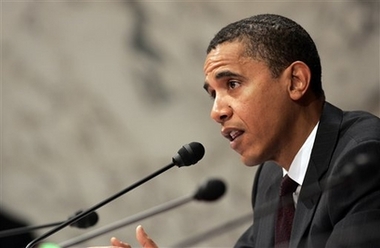US senators warn against war with Iran
(AP)Updated: 2007-01-31 08:53
WASHINGTON - Republican and Democratic senators warned Tuesday against a drift toward war with an emboldened Iran and suggested the Bush administration was missing a chance to engage its longtime adversary in potentially helpful talks over next-door Iraq.
Obama, a candidate for president in 2008, warned during the Senate Foreign Relations Committee hearing that senators of both parties will demand "clarity and transparency in terms of US policy so that we don't repeat some of the mistakes that have been made in the past," a reference to the faulty intelligence underlying the US invasion of Iraq.
Sen. Chuck Hagel, R-Neb., a possible presidential candidate, asked Negroponte if he thinks the United States is edging toward a military confrontation with Tehran. In response, Negroponte repeated President Bush's oft-stated preference for diplomacy, although he later added, "We don't rule out other possibilities."
Separately, the Navy admiral poised to lead American forces in the Middle East said Iran wants to limit America's influence in the region.
"They have not been helpful in Iraq," Adm. William Fallon told the Senate Armed Services Committee. "It seems to me that in the region, as they grow their military capabilities, we're going to have to pay close attention to what they do and what they may bring to the table."
The Bush administration has increased rhetorical, diplomatic, military and economic pressure on Iran over the past few months, in response to Iran's alleged deadly help for extremists fighting US troops in Iraq and the long-running dispute over Iran's nuclear program.
Bush said Tuesday the United States "will deal with it" if Iran escalates military action inside Iraq and endangers American forces. But, in an interview with ABC News, Bush emphasized this talk signals no intention of invading Iran itself.
A day earlier, the president acknowledged skepticism concerning US intelligence about Iran, because Washington was wrong in accusing Iraq of harboring weapons of mass destruction before the US-led invasion in 2003. "I'm like a lot of Americans that say, 'Well, if it wasn't right in Iraq, how do you know it's right in Iran,'" the president said.
Washington accuses Iran of arming and training Shiite Muslim extremists in Iraq. US troops have responded by arresting Iranian diplomats in Iraq, and the White House has said Bush signed an order allowing US troops to kill or capture Iranians inside Iraq.
The United States also accuses Iran of secretly developing atomic weapons - an allegation Tehran denies. Iran's refusal to suspend uranium enrichment lead the UN Security Council to impose limited economic sanctions.
Senators including Hagel, George Voinovich , R-Ohio, and Joseph R. Biden Jr., D-Del., sounded frustrated with the administration's decision not to engage Iran and fellow outcast Syria in efforts to reduce sectarian violence in Iraq.
Negroponte, a career diplomat who is leaving a higher-ranked job as the nation's top intelligence official, gave only a mild endorsement of the administration's diplomatic hands-off policy toward Damascus and Tehran.
Negroponte would lead the department's Iraq policy if confirmed, as expected. He said Syria is letting 40 to 75 foreign fighters cross its border into Iraq each month and repeated the charge that Iran is providing lethal help to insurgents fighting US forces in Iraq. Iran and Syria are not helping promote stability and peace in Iraq and understand what the United States and other nation expect of them.
"I would never want to say never with respect to initiating a high-level dialogue with either of these two countries, but that's the position, as I understand it, at this time," Negroponte said.
The Senate Foreign Relations Committee is expected to approve Negroponte quickly for a job vacant since July.
|
||
|
||
|
|

